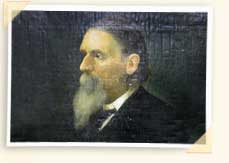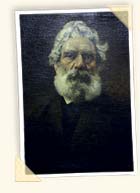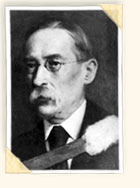
Alfred Perry
The initial “push” for the creation
of the Hospital came from Alfred Perry, a prominent citizen
and a Montreal fire marshal. Mr. Perry was determined to
improve the quality of care for the mentally ill. In the
1870s, he criticized Quebec’s “farming out” system,
where private citizens were paid to care for patients. Mr.
Perry claimed that many did so as cheaply as possible, in
order to pocket the money for their personal use. Historical
accounts of the day support his claim.
When the Roman Catholic Asylum at Longue-Pointe (today’s
Hôpital Louis-H Lafontaine) was built in 1875, Mr.
Perry was not satisfied. Although he acknowledged that the
asylum supplied patients with food, clothing and shelter,
he believed that no attempt was being made to improve their
mental condition, and complained that no religious services
were offered for Protestant patients.
After repeated lobbying by Mr. Perry, Protestant clergymen,
and other citizens, the Quebec Government passed an act titled “An
Act to Incorporate the Protestant Hospital for the Insane” and
the idea for our hospital was born.
 James Douglas James Douglas
Although he looks rather stern, James Douglas, MD, was a compassionate and
progressive doctor for his time. He promoted the idea that people with mental
illness should have a healthy environment, with a full program of work and
amusement—a philosophy that appealed to Medical Superintendent T.J.W.Burgess,
MD, and profoundly shaped our approach to care. In 1965, the Hospital was named after him, and also after his son, James Douglas, LLB, whose donations helped keep the Hospital alive during the fiscally challenging early years.

Thomas Joseph Workman Burgess
The first medical superintendent of the Douglas Hospital, Thomas Joseph Workman
Burgess, MD, came to the post in 1889 with twenty years of experience in three
Ontario psychiatric hospitals. He was a remarkable doctor, administrator, fundraiser,
and humanitarian, and ran the Hospital as a captain would a tight ship.
He believed that good food, sound sleep and regular exercise
were the best treatments for patients, since there were no
effective medications or other treatments at the time. He
fought passionately against the use of restraints, writing
in 1895, “A patient who is brought to us and finds
that, however excited… is not put in solitary confinement….not
trussed up helpless in a strait-jacket, is not even drugged
into insensibility, forgets to be violent in his surprise
at finding that no cause for violence is given him.”
For 33 years, he oversaw everything from patient treatment
to hiring to maintenance to food production. Just as important,
he was a master at attracting and holding the interest of
wealthy donors.
If one person could be said to represent the optimism, caring,
humanity and drive of the Douglas spirit, it is undoubtedly
T.J.W. Burgess. |